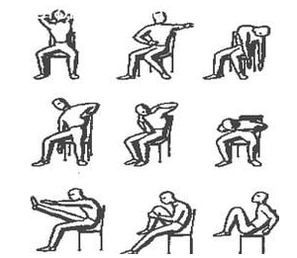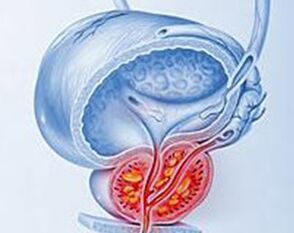Male prostatitis is the most common urological disease among men. According to statistics, the number of men suffering from this disease accounts for 8% of the world's male population, and 1/3 of them are the owners of chronic diseases. In 40% of cases, chronic prostatitis in men is detected before the age of 40.
A distinctive feature of prostatitis is the almost complete absence of its acute form. As soon as he appeared, he immediately took a chronic form.
Cases of complete recovery (spontaneous or after treatment) after the initial acute phase are very small. The course of the disease is very slow, and the symptoms of prostatitis are usually relieved. Prostatitis manifests as three main syndromes: pain, sex and dysuria.
Causes of male prostatitis
The cause of prostatitis is infection, prostate gland stagnation and a combination of these two factors. One of the inducements for the development of chronic prostatitis is also the presence of benign hyperplasia in patients.
Infection can enter the prostate as follows:

- Passing through the urethra through sexual contact as a complication of infectious urethritis;
- Infections from existing infections (tooth decay, sinusitis, pneumonia and others) from the body through the blood;
- Through lymph from internal inflamed organs (enteric malnutrition, hemorrhoids, rectal inflammation).
The most common type of male prostatitis is a non-infectious disease (non-bacterial prostatitis). The main reason is that the blood circulation of the prostate and surrounding organs is violated due to stagnation of prostate secretions.
In the prostate, secretion is stagnated due to the following factors:
- Long-term abstinence;
- Failure to achieve sexual contact after sexual arousal;
- Interrupted sexual intercourse;
- Poor ejaculation.
Factors susceptible to prostatitis:
- Irregular sex life;
- Low temperature;
- Lack of motivation
- Chronic stress
- Chronic alcoholism and others.
Symptoms of male prostatitis
- Pain in the genital area;
- Pain in the groin, perineum, and suprapubic area;
- Often urged to urinate;
- Pain when urinating;
- Painful ejaculation;
- Poor erection or lack of erection.
Neurasthenia caused by the above-mentioned diseases often leads to chronic prostatitis.
Usually, the pain of prostatitis is radioactive, which radiates to the bone, perineum or scrotum. All organs from the prostate to the small pelvis have nerve endings, so the lower back usually feels pain. They vary in intensity-from subtle to obvious, and can even disrupt sleep. Abstinence can exacerbate pain and reduce sexual desire, or conversely, excessive sexual activity or ejaculation can cause pain. It should be noted that the bone pain does not always indicate prostatitis-they may also indicate osteochondrosis.
How prostatitis manifests in chronic people is completely different here. Its course is wavy; periodic deterioration is replaced by more or less prolonged remission, during which the disease does not manifest itself in any way. In this case, men rarely go to see a doctor, and prefer to sit at home. However, this is not a way to get out of trouble, because male prostatitis and its exacerbation will develop over time. In addition, transmission through the genitourinary system will lead to cystitis and pyelonephritis.
Male prostatitis: consequences

Generally, patients with acute prostatitis should seek medical help in time. However, if you do not seek help from a urologist in time, there is a high possibility of local purulent inflammation-prostate abscess. In this case, body temperature may rise to 39-40°C, become busy (body temperature drops by more than 1°C), and severe fevers are regularly replaced by chills. The pain in the perineum is so obvious that it becomes extremely impossible to urinate and defecate. The prostate gradually swells, resulting in urine retention. Fortunately for men themselves, they rarely bring themselves into this state.
When the seminal vesicles become inflamed, vesicular inflammation is one of the most common complications of prostatitis. There is also epididymal orchitis, which is characterized by inflammation of the testis and its appendages. The treatment of male chronic prostatitis caused by these diseases will be extremely difficult and time-consuming.
Both diseases can cause infertility. All the content described is related to chronic prostatitis, which has a specific etiology and is caused by sexually transmitted diseases. The urologist prescribes how to treat male prostatitis and any form of medication.
Treatment of male prostatitis
How men treat prostatitis depends on the form of the disease and its appearance. In the treatment of acute prostatitis, antibiotics are used, and they can penetrate well into the prostate tissue. The prescribing expert must consider all the individual characteristics of the disease, the state of the human immune system, and the presence of infectious agents. If the course of the disease is not complicated, only patients with acute prostatitis are treated in the outpatient clinic. Only patients with signs of severe poisoning can be hospitalized. This physical therapy method is widely used: magnetic laser induction therapy, reflex therapy, ultrasound, and water treatment to treat prostatitis. Good results can be achieved by using herbal preparations (herbal medicine), enzymes, cell mediators, and immunomodulators. Prostatitis surgery is required in the following cases:
- Prostatic abscess (drainage through the urethra, through the urethra or through the rectum);
- Acute urine retention (puncture for cystostomy).
The treatment of male chronic prostatitis is carried out in the outpatient clinic, but it takes longer. In addition to antibiotics, suppositories and heat treatment, prostate massage and reflexology are also performed. In addition, it is recommended that patients with prostatitis maintain an active lifestyle and avoid alcoholic beverages and spicy foods.
Prevent male prostatitis
Timely treatment of male prostatitis and its preventive measures will help rapid recovery. As a preventive measure to prevent the development of chronic prostatitis, it is recommended:
- Regular sex life;
- Choose your diet appropriately (except for changing and nutritious foods and spicy and irritating foods);
- No alcohol
- Moderate physical activity aimed at improving the blood circulation of the organs of the genitourinary system and strengthening the muscles, Kegel exercises (the tension of the perineal muscles and the contraction of the anus);
- Treat infectious diseases of other organs adequately and promptly;
- Physical therapy prevents stagnation of the small pelvis.
Exclude the recurrence of the disease-secondary prevention of prostatitis, including primary prevention and:
- Regular preventive examinations with urologists;
- Preventive treatment of multi-vitamins through intensive methods;
- Physical therapy methods (especially in spring and autumn).






























